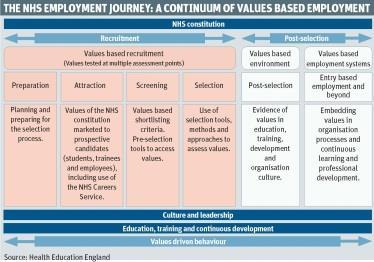By using values based recruitment, NHS organisations can create a workforce that really wants to do the best for patients, as Ingrid Torjesen finds out

Values based recruitment is about ensuring that the NHS hires people whose personal values align with those of the NHS constitution and the organisation they apply to work for. It is about enhancing existing recruitment processes that already ensure the NHS recruits candidates with the right skills and aptitude.
Some organisations have been using values based recruitment for several years, but its popularity has increased dramatically since the publication of the Francis report on Mid Staffordshire Foundation Trust.
The report highlighted the importance of the NHS employing staff who not only have the right qualifications and experience, but also values that align with those of the service, such as compassion and respect.
- HSJ reveals first ever LGBT Role Models
- Making sense of the Francis focus on leadership
- More news and resources on workforce
- See the latest job vacancies on HSJ Jobs
Common sense benefits
Lydia Larcum, programme manager for the values based recruitment project at NHS Employers, says that staff employed using this approach are happier and more engaged, which benefits employers, employees and patients.
“Organisations have been able to demonstrate a significant reduction in staff turnover; they’ve seen reduced sickness absence levels and increased job satisfaction,” she says.
‘If we go to work and are happier, we are going to be more productive’
“We know that this has real benefits. A lot of it is common sense. If we go to work and we are happier and feel as though we fit within our organisation, we are going to be more productive. We are going to want to be there and go the extra mile. That’s what it’s about.”
Implementing values based recruitment is a priority programme for Health Education England (HEE). The organisation is due to launch a national values based recruitment framework and a toolbox of evidence based resources next month. The idea is for universities and employers to embed these values into their recruitment processes.
The HEE programme incorporates three elements:
- recruiting for values in higher education institutions when selecting students for all new NHS funded training posts by March 2015;
- recruiting for values when NHS organisations employ staff, an initiative that is being carried out in partnership with NHS Employers; and
- providing the evidence base for values based recruitment.
While the NHS constitution’s values are at the heart of the NHS, each organisation will have its own unique set of values, in a language that resonates with its staff, patients and service users. NHS Employers and Health Education England have created a tool that enables organisations to easily map their values to those within the NHS constitution.
Recruitment tools
When designing bespoke tools for recruiting staff to specific posts, it is helpful for organisations to conduct a role analysis and develop a framework, outlining the behaviours they would expect to see if a person had the desired values, and those that they would not expect to see.
Exploring whether a candidate’s personal values align with those of the NHS organisation requires a different approach to assessing their knowledge, qualifications or experience.
‘You’d want the values to flow through the induction, the training, development and appraisal process’
One recognised and evidence based way of doing this is to use a structured values based interview. This is similar to a traditional interview, but the questions are designed with a set of behavioural indicators. “You’re asking candidates to provide examples of behaviour that they have previously demonstrated, or to explain how they would respond to a particular situation,” Ms Larcum explains.
Values cannot be assessed with superficial questions asked in a rushed manner, she adds, “to pull out relevant examples and behaviours, a probing or conversational style of questioning and listening is needed, so that it pushes into the candidate’s rationale and understanding”.
Employers can also put candidates through situational judgement tests or use assessment centres.
Situational judgement tests can be written, online or video based. These present the candidate with a scenario followed by a number of possible responses, from which he or she has to select the most appropriate.
Assessment or selection centres can include tasks where the candidate is asked to participate in a role-play scenario, so that interaction and responses can be observed and scored by a trained observer.

“While it would be wonderful to have one assessment or approach that could test for all types of values, the evidence suggests that a more tailored approach is required,” says Nicki Latham, chief operating officer of Health Education England.
She considers it a high priority that values based recruitment methods are evidence based and can be shared across higher education institutions and employers through HEE’s values based recruitment framework.
One approach that is commonly used by universities is the personal statement, but the evidence suggests that this lacks the validity in assessing for values that an interview would more effectively test.
“What we’re doing now is investing some money to train people in values based interviewing, not only in universities but also in trusts,” Ms Latham says. “We’re developing a training package in order to do this.”

The people who we are funding the training now will still be working in the NHS in 2050 so this is an important investment, Ms Latham points out.
“We don’t know what the actual future workforce will look like, but we do know the values around the NHS will still be absolutely clear - that we will need to work with respect, dignity and compassion. That will never change.”
Ms Larcum emphasises that the HEE values based recruitment programme should mark the start of a values based employment journey (see diagram, above).
“We can’t bring people into an organisation with a set of values that we are looking for, and that they expect the organisation to have, if the other parts of the employment life cycle don’t marry up. You’d want the values to flow through the induction, training, development, appraisal and all employment processes.”
“It is by living and working with the values that you achieve staff engagement as well as positive patient experience and care,” she says.
Turn values into action: our role is to make it easier for employers that are working hard to improve staff experience, says NHS Employers’ Caroline Waterfield
Over the past 18 months there has been a lot of focus on values - what we do with them and are we recruiting for them?
When NHS Employers started its work programme last year I wanted to make sure we showcased the great work that employers have been doing, as well as provide opportunities to build expertise and share learning.
We have had an overwhelming response, with HR and organisational development leads from across the country asking to be involved.
A group of dedicated, passionate people have helped us to shape the work programme. Through our network of “partners” and workshops we have been able to provide access to information, ideas and shared learning.

From the work we’ve done at NHS Employers we know that it’s not enough to just have values and know about them.
We use five small words that form the core of how we work and how we behave with each other are: assured, bold, leading, expert and respect.
We created a huge amount of momentum and connection to our values, but to translate the engagement into actual culture change we also needed to incorporate our values into our systems and processes.
The job of articulating how a manager could make decisions about shortlisting, assessment and selection using our values became just as important as creating the initial buy-in.
Our programme for employers has a focus on embedding values into recruitment processes but the principles can just as easily be applied to appraisal.
Recruitment seemed a sensible place to start - across the NHS we spend vast amounts of time advertising, shortlisting and going through assessment and selection processes. This wasn’t about starting with a blank sheet of paper but enhancing what already existed and using an evidence base to steer our activity.
We know as a national organisation that we can’t do the work for people.
But I hope that by developing the network, generating ideas, sharing the evidence base, producing resources and providing training on values based interviewing, we are able to make it easier for the many employers who are working hard to improve staff experience by using their values to ultimately improve the experience for patients
Singling out a few case studies from the many we have for this special report was really difficult and you can find more on the NHS Employers website. If you want to be involved in the network, please get in touch.
Caroline Waterfield is assistant director of employment services at NHS Employers
Follow her at @NHSE_Caroline. See more information about the project
Workforce special report: Going the extra mile

Using values based recruitment
 Currently
reading
Currently
reading
Workforce special report: Going the extra mile
- 2





























6 Readers' comments